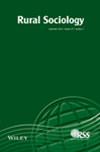拯救荒野还是拯救牛仔?旧西部和新西部之间的文化冲突 *
IF 2.3
3区 社会学
Q2 SOCIOLOGY
引用次数: 0
摘要
在蒙大拿州中北部,一场以环保组织 "美国草原 "为中心的土地冲突引发了 "拯救牛仔,阻止美国草原保护区 "脸书页面的建立,吸引了来自牧场主和该地区依赖农业的社区成员的帖子和评论。尽管蒙大拿州的设施迁移和乡村城市化发展迅速,但这一地区仍在很大程度上保留了其古老的西部文化。因此,"拯救牛仔 "组织的成员经常对美国草原公司的大规模野化计划和土地收购如何影响该地区的农村社区表示不满。在这项定性内容分析中,保存旧西部文化和避免新西部转型的担忧在拯救牛仔的 Facebook 帖子和评论(N = 1,002)中占据了主导地位,即使与表面上更关心的经济和生态问题相比也是如此。通过描述旧西部内部人士与新西部外部人士之间文化对立的社会空间,本研究指出了将旧西部与新西部冲突本质化的危险。本研究阐述了老西部内部人如何利用其文化资本来对抗农村变革,并通过提出 "新西部 "这一术语来扩展老西部-新西部类型学,以捕捉老西部内部人如何通过贬低缺乏必要知识的新来者来维护其主导地位。本文章由计算机程序翻译,如有差异,请以英文原文为准。
Saving the Wild or Saving the Cowboy? Cultural Conflict between the Old and Nouveau West*
In North Central Montana, a land‐based conflict centered on the environmental organization American Prairie sparked the formation of the “Save the Cowboy, Stop the American Prairie Reserve” Facebook page, attracting posts and comments from ranchers and members of the area's agriculture‐dependent communities. Despite Montana's rapid amenity migration and rural gentrification, this region has largely maintained its Old West culture. Consequently, Save the Cowboy members often express frustration about how American Prairie's large‐scale rewilding initiative and land acquisitions affect the region's rural communities. In this qualitative content analysis, concerns about preserving the Old West culture and avoiding the New West transformation dominated Save the Cowboy's Facebook posts and comments (N = 1,002), even compared to the ostensibly more concerning economic and ecological issues. By describing a social space marked by cultural antagonisms between Old West insiders and New West outsiders, this study points to the dangers of essentializing Old West‐New West conflicts. Illustrating how Old West insiders deploy their cultural capital to contest rural change, it also expands the Old West‐New West typology by proposing the term “Nouveau West” to capture how Old West insiders assert dominance by disparaging newcomers who lack the requisite knowledge of how things are done locally.
求助全文
通过发布文献求助,成功后即可免费获取论文全文。
去求助
来源期刊

RURAL SOCIOLOGY
SOCIOLOGY-
CiteScore
4.60
自引率
13.00%
发文量
47
期刊介绍:
A forum for cutting-edge research, Rural Sociology explores sociological and interdisciplinary approaches to emerging social issues and new approaches to recurring social issues affecting rural people and places. The journal is particularly interested in advancing sociological theory and welcomes the use of a wide range of social science methodologies. Manuscripts that use a sociological perspective to address the effects of local and global systems on rural people and places, rural community revitalization, rural demographic changes, rural poverty, natural resource allocations, the environment, food and agricultural systems, and related topics from all regions of the world are welcome. Rural Sociology also accepts papers that significantly advance the measurement of key sociological concepts or provide well-documented critical analysis of one or more theories as these measures and analyses are related to rural sociology.
 求助内容:
求助内容: 应助结果提醒方式:
应助结果提醒方式:


